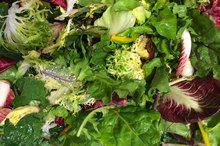Potassium Levels in Meat
An essential mineral for good health, potassium balances fluid and lowers your blood pressure. According to the American Heart Association, women are more likely to develop high blood pressure as they age than men. Including lean meat and other potassium-rich foods into your diet can help keep your heart and blood vessels healthy for the long haul.
Roles of Potassium
Potassium acts as an electrolyte in the body, helping to regulate metabolism, build muscles, and sustain proper functioning of every cell, tissue, nerve and organ. Without potassium, you could even disrupt the normal electrical activity in the heart, explains the National Institutes of Health. Potassium also works with sodium to balance fluid in your body. A high-sodium diet raises blood pressure, but a high-potassium diet promotes healthy blood pressure levels.
- Potassium acts as an electrolyte in the body, helping to regulate metabolism, build muscles, and sustain proper functioning of every cell, tissue, nerve and organ.
- A high-sodium diet raises blood pressure, but a high-potassium diet promotes healthy blood pressure levels.
Recommendations
Sources of Electrolytes
Learn More
Though potassium is found in many foods, most people don't get enough of this element in their diets, warns Colorado State University. The Institute of Medicine recommends that adult women consume up to 4,700 milligrams a day, but most people only consume half this amount. Lean meats, fruits, vegetables and whole grains are good sources of potassium.
High-Potassium Meats
Some of the leanest cuts of meat are the best sources of potassium, according to Colorado State University. Three ounces of chicken provide 383 milligrams of potassium and 3 ounces of fish provide 375 milligrams. Canned tuna and salmon are even better sources, providing 484 milligrams, or 10 percent of the daily recommendation, per 3 ounces.
Other Meat Sources
How Much Potassium Does a Female Need?
Learn More
Three ounces of beef and lamb contain approximately 250 milligrams of potassium. Ham and pork provide 182 milligrams and 105 milligrams respectively. Bacon, bologna and corned beef provide only 45 to 60 milligrams per serving. These processed meats also contain high levels of saturated fat and sodium, which can increase your risk of high blood pressure and heart disease over time.
- Three ounces of beef and lamb contain approximately 250 milligrams of potassium.
- Bacon, bologna and corned beef provide only 45 to 60 milligrams per serving.
Tips
Get the most potassium out of your meal by balancing your meat entree with potassium-rich plant foods. A plain baked potato and a 1/2 cup of cooked greens provides a total of 1,265 milligrams of potassium. Paired with 3 ounces of grilled chicken, this lean meal provides approximately 35 percent of your recommended potassium intake. Low-fat dairy products also provide potassium, so add a cup of low-fat milk to your meal for an extra 382 milligrams of potassium, or a total of 2,030 milligrams for the entire meal.
- Get the most potassium out of your meal by balancing your meat entree with potassium-rich plant foods.
- Low-fat dairy products also provide potassium, so add a cup of low-fat milk to your meal for an extra 382 milligrams of potassium, or a total of 2,030 milligrams for the entire meal.
Related Articles
References
- National Institutes of Health: Potassium in Diet
- American Heart Association: High Blood Pressure and Women
- Aburto, et. al. Effect of increased potassium intake on cardiovascular risk factors and disease: systematic review and meta-analyses. BMJ. 2013 Apr 3;346:f1378. DOI: 10.1136/bmj.f1378.
- Appel LJ, Moore TJ, Obarzanek E, et al. A clinical trial of the effects of dietary patterns on blood pressure. DASH Collaborative Research Group. N Engl J Med. 1997;336(16):1117-1124.
- Ferraro PM, et. al. Dietary Protein and Potassium, Diet–Dependent Net Acid Load, and Risk of Incident Kidney Stones. CJASN. October 2016, 11 (10) 1834-1844; DOI: 10.2215/CJN.01520216
- Granchi, D, et. al. Potassium Citrate Supplementation Decreases the Biochemical Markers of Bone Loss in a Group of Osteopenic Women: The Results of a Randomized, Double-Blind, Placebo-Controlled Pilot Study. Nutrients. 2018 Sep 12;10(9). pii: E1293. DOI: 10.3390/nu10091293.
- Linus Pauling Institute. Potassium.
- Macdonald, HM, et. al. Effect of potassium citrate supplementation or increased fruit and vegetable intake on bone metabolism in healthy postmenopausal women: a randomized controlled trial. Am J Clin Nutr. 2008 Aug;88(2):465-74.
- National Institute of Health. Office of Dietary Supplements. Potassium.
Writer Bio
Based in Minneapolis, Minn., Dana Severson has been writing marketing materials for small-to-mid-sized businesses since 2005. Prior to this, Severson worked as a manager of business development for a marketing company, developing targeted marketing campaigns for Big G, Betty Crocker and Pillsbury, among others.









